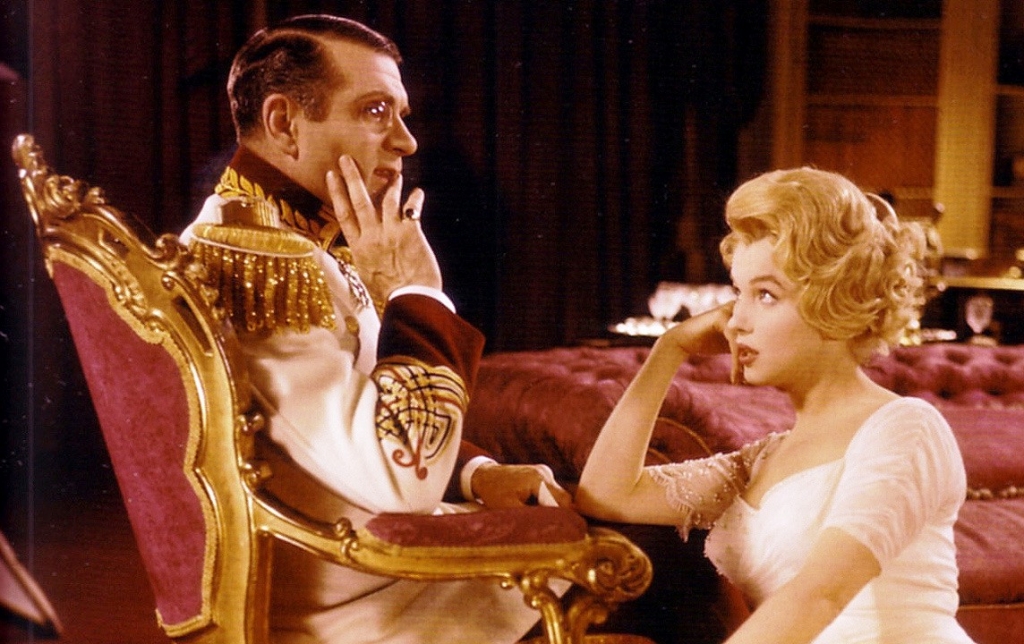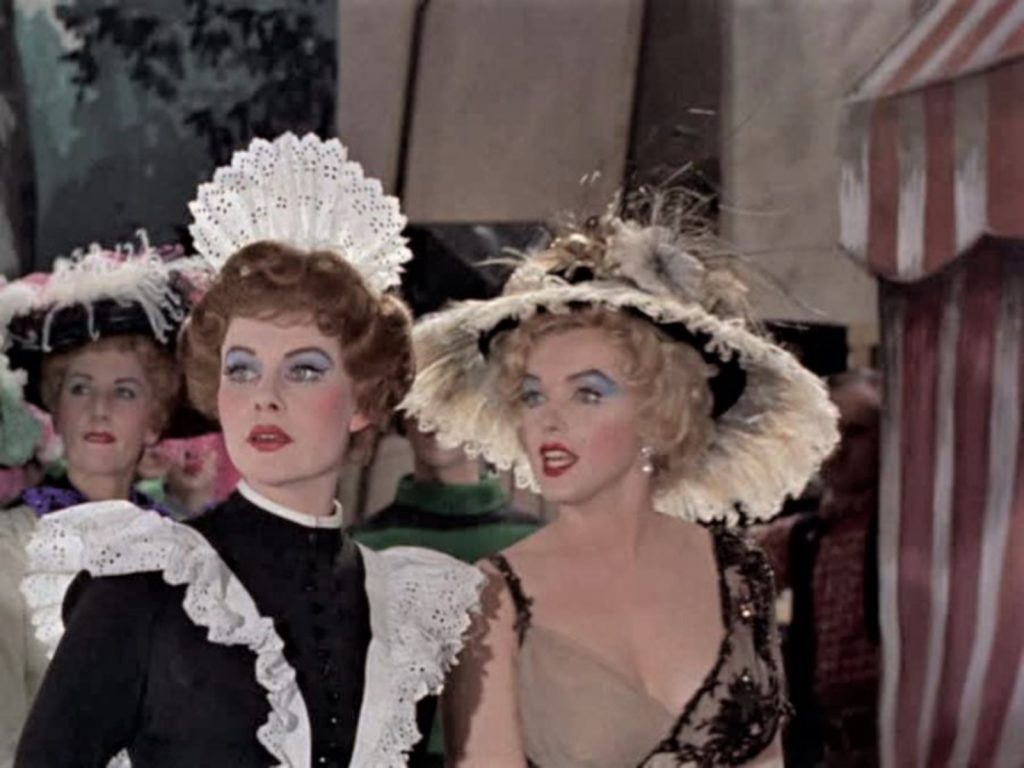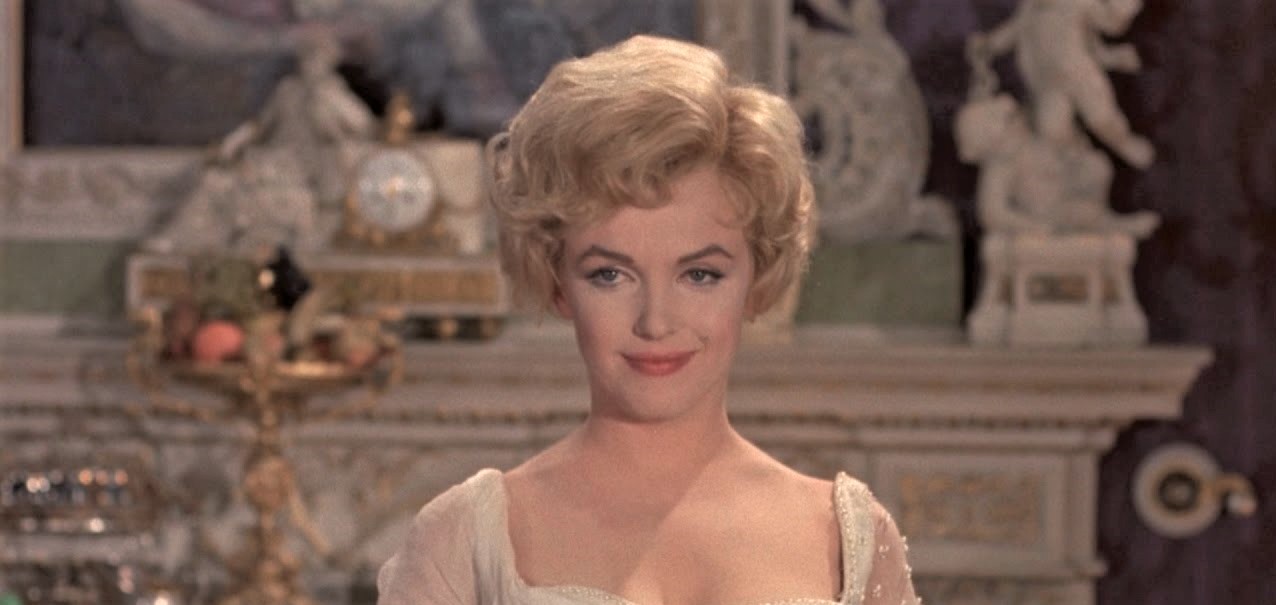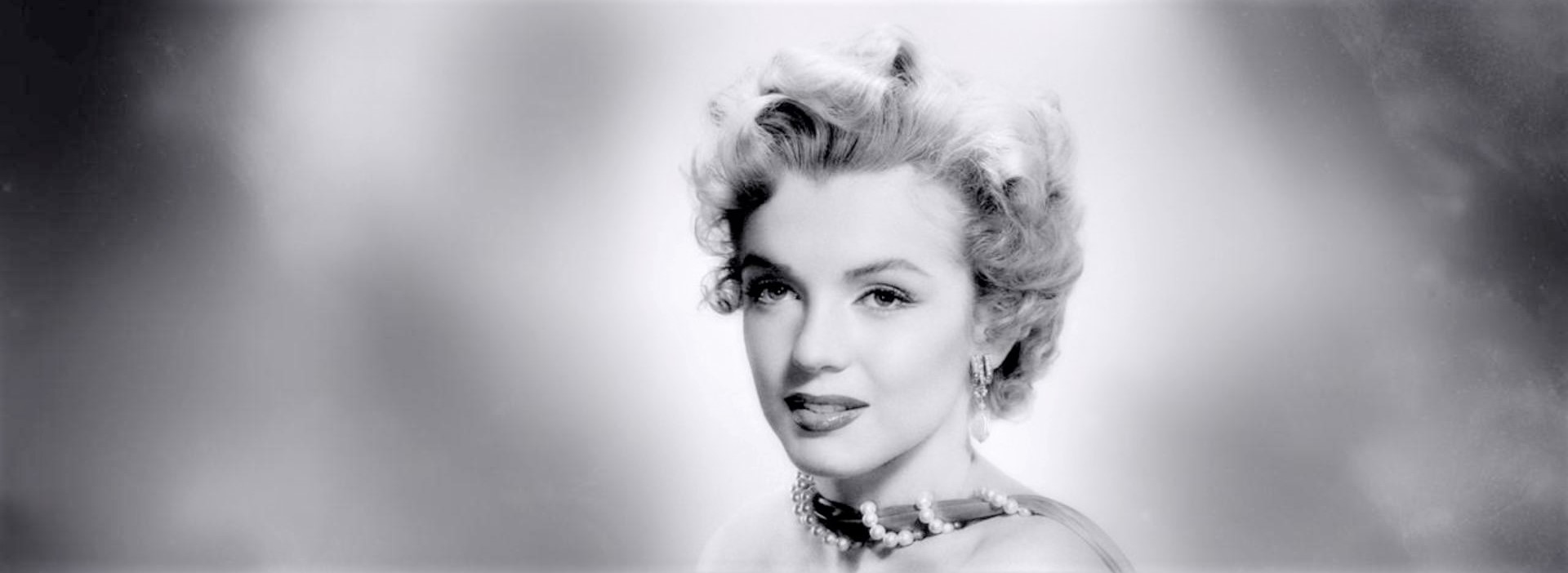The Prince and the Showgirl
13 June 1957
The World’s Greatest Movie Star Meets The World’s Greatest Actor

On a rainy July afternoon in 1956, Friday the 13th, Marilyn and the new Mr. Monroe, husband, playwright and past Pulitzer Prize winner, Arthur Miller, boarded an airplane in New York City and embarked for London. Arthur had recently testified before the House Un-American Activities Committee, a body established by the House of Representatives to probe the alleged communist infiltration into Hollywood, American art and the American cinema. Due to his uncooperative testimony, refusing to reveal the names of friends and other associates who were communists, Mr. Miller was cited for contempt. Obviously, the contempt citation did not prevent his passport from being renewed, that is, not after he announced that he was in love with and planned to marry the most famous and most popular cinema actress in the world. The weight of Arthur’s legal problems did not prevent the airplane from flying through the night, without incident, and landing the following morning, a rainy Saturday, at Heathrow Airport. By all accounts, her long awaited arrival created absolute bedlam. After deplaning, Marilyn and Arthur were greeted by Sir Laurence Olivier and his wife, Scarlett O’Hara. Vivien Leigh, a throng of reporters, photographers, sundry journalists and more than a few fans were also there to greet Marilyn.

Two years or so ago, a couple of my Hollywood friends, as a sort of joke after a dinner party, ran this now-twenty-five-year-old picture for me on their library projection machine. I was a bit embarrassed, as I didn’t know how long it might be before the joke would begin to get a bit tired. However, the picture ran through, much to my surprise. At the finish, everyone was clamorous in their praises; how such enchantment could have been poorly received defied imagination. I was as good as could be, and Marilyn! Marilyn was quite wonderful, the best of all. So. What do you know?
Sir Laurence Olivier, Director and Costar, The Prince and the Showgirl
On the 6th of May in the year 1910, King Edward VII died as a result of several heart attacks he had suffered during the previous day. The King is dead; long live the King. The following year, England prepared to crown George Frederick Ernest Albert, Prince of Wales and Earl of Chester, King George V. During June of 1911, hundreds of dignitaries, along with royalty and representatives of royalty, began to arrive in London to attend the coronation of George and his wife, Mary, at Westminster Abbey on the 22nd.
Among the arriving royalty were the Regent of Carpathia, Prince Charles, his young son, King Nicolas, and the Dowager Queen, mother of Charles’ deceased wife and Nicholas’ grandmother. Prince Charles’ arrival in London and his appearance at the coronation were significant: trouble was brewing in Europe: war appeared to be on the horizon. Charles was pro-England but Nicholas, who would not formally become King for eighteen months, was pro-Germany.
The British government was fearful that the inevitable transfer of power from Charles to Nicolas would upset the balance of power in the Balkans, shift more to Germany: Carpathia had the fourth largest army in Europe. They feared this power shift just might precipitate a war. Since the English Foreign Office wanted to keep Carpathia pro-England, they dispatched civil servant Northbrook to pamper and attend to the wishes of their important Carpathian guests. On coronation eve, Northbrook arranged for the Regent to attend a musical starring Maisie Springfield, Charles’ friend and often his bed partner. After the performance, the cast members formed a greeting line; and the Prince stiffly but amicably greeted each performer. He was particularly enchanted by Miss Elsie Marina, an American, primarily because one of her shoulder straps broke, nearly exposing her lovely you-know-what. So enchanted was the Prince that he invited her to join him for a midnight supper. He intended to seduce Elsie, but she expertly repelled his sexual advances. The evening did not end happily for the Regent. Elsie drank too much vodka and champagne and passed out on the floor. Servants transferred her to a royal bedroom, where she spent the night.
Over the next couple of days, Prince Charles attempted to rid himself of Elsie, all to no avail, which happened to be more than beneficial. While in the embassy, Elsie learned of Nicholas’ plot with Germany to overthrow his father; but she did not immediately reveal the secret. The Queen Dowager appointed Elsie at Lady In Waiting for a day; the Dowager and Elsie attended the coronation of King George V at Westminster Abbey where the Pomp and Circumstance of the coronation touched Elsie. To express his gratitude for not exposing his plot, Nicolas invited Elsie to attend the Coronation Ball as his escort; there Elsie helped defuse the tense, bellicose relationship between father and son; and in so doing, defused a tense, bellicose political situation, possibly even averted a world war. All things considered, not bad for a stupid American actress; and of course, the prince and the showgirl fell in love with each other.

The general misconception is that Sir Laurence Olivier “hired” Marilyn to star alongside him in Terrance Rattigan’s play The Sleeping Prince. Actually, the part of Elsie Marina had been suggested as a potential role for Marilyn in 1954 by Hugh French, her agent at the time; and Charles Feldman, who produced The Seven Year Itch, attempted to purchase the drawing room comedy as a vehicle for Marilyn.
In February of 1956, Marilyn intercepted Rattigan during his trip from London and obtained the movie rights during a bar room meeting in Manhattan. She hoped Sir Laurence Olivier would play the Carpathian prince and she also hoped that associating herself with the most acclaimed stage actor in the world would afford her, not necessarily similar acclaim, but some additional respectability. Olivier would agree to appear in the movie if and only if Laurence Olivier Productions co-produced along with Marilyn Monroe Productions and he was hired to direct the movie. Over the objections of Lee Strasberg, who considered Sir Laurence a poor choice to direct because of the thespian’s aversion to method acting, all the involved men, women and children agreed to make a movie featuring the world’s greatest and most famous movie star and the world’s greatest and most famous stage actor at Pinewood Studios outside London. Warner Brothers agreed to distribute the movie and to capitalize on Marilyn’s fame and her persona, Jack Warner suggested a title change. So The Sleeping Prince became The Prince and the Showgirl. So, for all intents and purposes, then, Marilyn hired Sir Laurence Olivier, not the other way around.
What amounts to a nineteenth century drawing room comedy, filmed in nineteen fifty-six England, is not the type of movie in which you expect to see Marilyn Monroe, more suited to Laurence Olivier and the other stage actors who appear alongside her in what is essentially a play. Yet, Marilyn’s performance as Elsie Marina, along with Dame Sybil Thorndike’s humorous portrayal of the willful Dowager Queen, are the highlights of a movie that rambles a bit, is slightly too long; and for contemporary audiences, will not provide enough titillation in the form of overt sex, noisy automobile chases and gunfights, machete slashing or loud explosions. In fact, the movie is absent those things. A direct reference to a wardrobe malfunction early in the movie that actually occurred, when Marilyn met Olivier and Rattigan in Manhattan, is as close to overt sex as the movie gets. O … and the dialogue isn’t constantly peppered with four-letter words or other forms of sentence enhancers. It’s doubtful that a contemporary audience will appreciate the swirling beauty of the large dance scene during the coronation ball or the touching and humorous love story based on reversing the roles of the prince and sleeping beauty.
Elsie Marina is not a dumb blonde: she speaks German, is educated in the ways of princes and other playboys, understands that young men need the understanding and approbation of their fathers and has the uncanny ability to mediate a tense political crisis while falling in love with a stiff Baltic dude who is nearly twice her age. Charles, the Regent of Carpathia, widower and father, is emotionally asleep and Elsie recognizes as much. She sets out to awaken him, not his libido―that is very much awake―she sets out to awaken his heart. Ultimately, she succeeds and they promise to reunite when Charles’ son is crowned king eighteen months hence; but the bitter sweet ending suggests that a reunion, complete with love and marriage, will probably never happen even though it is obvious that each and every member of the Royal Family has succumbed to Elsie’s charms.
Olivier received then, and receives now, some harsh criticism for his affected portrayal of Charles, but I don’t agree totally with that criticism. It appears to me that his interpretation of the character is this: like Olivier himself, Charles is a decent man portraying a man who needs to be tough and angry and slightly aloof; at least Charles believes as much. So Olivier’s characterization is mostly an external presentation of exaggerated gesture and speech. Thus he renders the Baltic Aristocratic as a humorous German-like caricature, seemingly aware at all times that a camera, and an audience, is, and will be, watching him. And yet he still has some fine moments in the movie. During the carriage ride to the coronation, for instance, when his attitude toward the ebullient Elsie begins to change, Olivier’s controlled change from a stern expression to an affectionate, accepting smile indicates Charles’ reluctance to succumb, to accept this commoner, and yet his inability to resist her. He is also very good in the scene during which he explains to Elsie how he really sees himself and feels about his role as Crown Prince of Carpathia. In those moments the Prince drops, along with Olivier, all the affectations of his role as Regent, the angry and aloof man.
Beautifully photographed by Marilyn’s favorite cinematographer, the legendary Jack Cardiff, she is her usual incandescent self, bubbly and effervescent, as light and refreshing as a peach. In a few scenes, particularly the coronation ceremony and the coronation ball, she is almost angelic; and in the scene during which Charles is occupied on the telephone while Elsie entertains herself with chicken salad, caviar and champagne, Marilyn is childlike, nothing less than a glass of Dom Pérignon, nothing less than amazing. Marilyn’s performance, when compared to Olivier’s, is more natural and unaffected, partly because of the differences between the characters, of course; but also because Marilyn’s search for a real Elsie is more internalized, based on her experiences with powerful men, based on the truth as she knew it. No surprise that she was awarded both the French and the Italian Academy Awards for her portrayal of the amazing Elsie Marina. The US Academy of Motion Picture Arts and Sciences ignored The Prince and the Showgirl, the first movie produced by Marilyn Monroe Productions.
Joshua Logan, who directed Marilyn in Bus Stop, remarked that pairing Olivier with Marilyn amounted to the most exciting idea since black and white; and if Olivier had only listened to Joshua’s advice, and warnings, along with Lee Strasberg’s, on the best way to direct Marilyn, The Prince and the Showgirl, as grand as it is, could have been even grander. The reasons why Sir Laurence decided not to heed the advice offered by Josh and Lee are not known. That is to say, I do not know his reasons. Lee Strasberg advised Olivier not to approach Marilyn from a purely technical aspect but from an emotional one: simply reveal the emotional response you want and get out of her way. Apparently that was beyond the grasp of Sir Laurence.
Marilyn was addicted to method acting, an esoteric approach to characterization that Olivier neither appreciated nor understood. Marilyn needed to understand her character’s motivation and feelings. All Olivier wanted was parroting of memorized lines. Once again, Marilyn had a director who wanted her to be robotic and enact commands. Her stubborn willfulness pushed him toward the edge. Additionally, he was constantly upstaged by her; so his enormous ego also interfered: he just could not handle the untrained movie star’s naturally dimming effect.
Trying to teach Marilyn to act is like trying to teach Urdu to a badger.
Sir Laurence Olivier, My Week With Marilyn
In his review of the 2011 movie, My Week With Marilyn, for The Guardian, Peter Bradshaw remarked on the differences between Marilyn and Sir Laurence this way: One was a sexy, feminine, sensual and mercurial diva. The other would go on to make Some Like It Hot (24 November 2011). Olivier’s often chauvinistic, ill-advised direction ruined any chance for a friendship much less a cordial working relationship.
Without question Marilyn Monroe and Laurence Olivier represented the extremes of acting philosophy, the method and the classical, the relatively new and the relatively old. Their encounter was not only a clash of acting techniques and perceptions but also a clash of cultures. As noted by Simon Curtis, who directed My Week With Marilyn, the world’s greatest movie star represented the glamour of Hollywood, youth and the future, while the world’s greatest actor represented the old sedate and rigid society of England just before the world veered headlong into the sixties, radical changes to popular music and fashion, the pill and the sexual revolution. The Prince and the Showgirl was a battleground; and it’s difficult to deny that Marilyn prevailed while Sir Laurence sustained some deep wounds: he would not direct another movie for fourteen years. Sadly, while Marilyn may have won the battle of cinematic titans, she obviously lost the war.
The Millers and the Oliviers posed for photographs at London Airport on the 20th of November as Marilyn and Arthur prepared to board their flight back home. Other than that photo-op, Donald Spoto reports in his Marilyn biography that the prince and the showgirl never met subsequent to their colossal clash in 1956. If they did, it is no where memorialized; therefore, it is doubtful that Olivier ever had an opportunity to tell her, like he did a few friends and associates after a screening of The Prince and the Showgirl late in his life, how he actually admired her and her performance as Elsie Marina. Olivier did, however, on more than one occasion and to more than one person, refer to her as a troublesome bitch. Marilyn never spoke an ill word about Sir Laurence Olivier; at least, not in public.
Kenneth Branagh, who portrayed Sir Laurence Olivier in My Week With Marilyn, sat for an interview with AnneThompson in November of 2011. Anne asked him to offer an opinion of Marilyn as an actress. Here’s what he offered in response:
Nowadays people do understand … this thing that actually Olivier experienced which was to be sort of bedazzled by the apparently effortless qualities of Marilyn … But Marilyn was still having to play a heightened style. It wasn’t a naturalistic drama, The Prince and the Showgirl. But never the less, she―and this is an example of artistry―she finds the style and then she disguises it and makes it natural. So that is both the achievement of technically a very able actress. That isn’t just falling off a log. That’s technique … it’s the art that hides the art.
Kenneth also commented that, in his opinion, Marilyn displayed a high level of skill that Olivier was awed by; but concerning Olivier’s overall problem directing Marilyn, his lack of patience with her, Kenneth said that Sir Laurence was
an impatient fellow … in her search for what she needed, the truth in the performance or this self-belief or whatever it was that may have been missing, he just became irrelevant, I think. He wasn’t use to that being the case in those around him. He was use to being the center of things, I think. And I think he was perplexed by it and he was in the position sometimes that maybe the world is with Marilyn Monroe: he wanted to be her friend. And he was ultimately sort of superfluous.
Obviously, nobody likes to feel irrelevant or superfluous, but it’s a shame that Sir Laurence did not listen to or enact the advice provided by Josh Logan and Lee Strasberg. Maybe it just boils down to ego and that’s a shame. It’s a shame, also, that he didn’t allow her to change costumes at least once.
In an interview regarding Sir Laurence’s amazing body of work, Kenneth stated that the thespian’s performance in The Prince and the Showgirl was the worst of his long career. He attributed the poor performance to problems in Olivier’s life, his troubled marriage to Vivien Leigh, who allegedly suffered a miscarriage during filming, her depression issues, his concerns over aging and, of course, fatigue caused by having to deal with his problematic co-star. I find Kenneth’s excuse for Sir Laurence odd, really. Here’s why.
Marilyn’s marriage to Arthur Miller, just a few weeks from the alter, was already in serious trouble. She discovered that Miller was often embarrassed by and ashamed of her; and Marilyn actually suffered a miscarriage during production, not to mention that she also had to deal with an intractable person in Sir Laurence, along with all the other imperious, snooty Brits. Yet, she delivered a wonderful performance as Elsie. Even Sir Laurence had to admit, eventually, that she eclipsed him on-screen; she was the more natural; she out performed him. She was the best of all. Who then, was the better actor?
Maybe Sir Laurence should have taken some acting lessons from his costar; but then, she would only live an additional six short years after her brief stay in England―not nearly enough time to teach Urdu to a badger.
